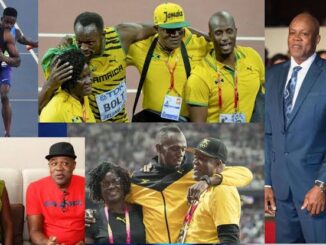
Sprint legend Usain Bolt has opened up on his heartbreaking disqualification at 2011 World Championships in the 100m final….
Kingston, Jamaica – May 5, 2025
Jamaican sprint legend Usain Bolt has reignited debate over false-start rules in athletics, as he emotionally reflected on his shocking disqualification from the 100m final at the 2011 World Championships in Daegu, South Korea.
In a new interview marking nearly 14 years since the incident, Bolt described the moment as “one of the lowest points” of his career, calling the one-strike false-start rule “too harsh” and “punishing to both athletes and fans.”
“I still remember the silence in the stadium after it happened,” Bolt said. “It felt like the entire world was holding its breath. One mistake, one movement — and I was out. Years of preparation gone in less than a second. It was heartbreaking.”
The 2011 World Championships saw Bolt, then reigning Olympic and world champion, disqualified for a false start under newly tightened regulations that allowed no second chances. His stunning exit stunned fans and left a void in the final, which was won by compatriot Yohan Blake.
Bolt, widely considered the greatest sprinter of all time, had previously called the rule change “a joke” in the aftermath of the disqualification, but had rarely spoken at length about the emotional toll it took — until now.
“People think I shrugged it off because I came back to win in London \[2012 Olympics], but truthfully, it stayed with me for a long time,” he admitted. “That night, I sat in my room questioning everything. It didn’t feel fair.”
His comments have reignited a long-standing debate within the athletics world about whether the strict no-tolerance false start rule — introduced in 2010 — should be revised. Critics argue that it punishes athletes too severely for a single lapse in concentration, especially under immense pressure on the global stage.
Legendary American sprinter Michael Johnson took to social media following Bolt’s interview, tweeting, “The one-strike rule does more harm than good. One mistake shouldn’t end a championship dream.”
Athletics fans also voiced their support online, with many calling for World Athletics to revisit the regulation and consider a return to the previous two-strike system or implement more advanced motion detection to distinguish genuine starts from nervous twitches.
World Athletics has not issued an official response to Bolt’s remarks, but insiders suggest the organization is aware of ongoing concerns, especially given the high-profile nature of Bolt’s legacy and influence in the sport.
In a poignant moment during the interview, Bolt concluded, “I don’t want sympathy. I just want the sport to be better — fairer — for the next generation. If we want to see the best perform on the biggest stages, we have to give them a real chance to do so.”
Despite the setback in Daegu, Bolt rebounded to cement his status as a legend with historic triple-triple gold medal performances at the 2012 and 2016 Olympics. Still, the 2011 disqualification remains a blemish on an otherwise flawless championship career — and a reminder of the fine margins that define greatness.



Be the first to comment